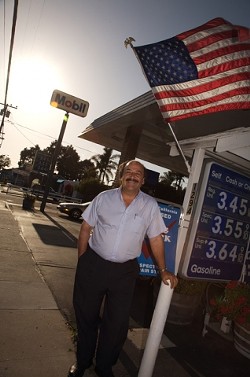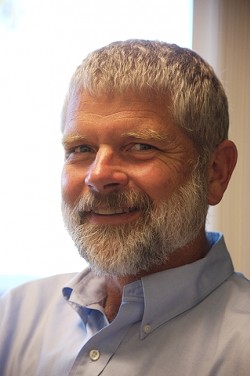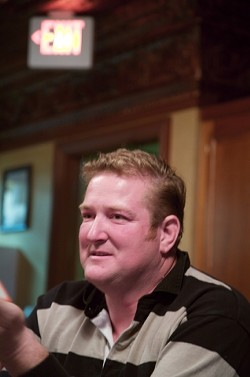Conflicted
Is a well-intended law sometimes subverting the will of the SLO County voters?
By Patrick Howe[{
"name": "Ad - Medium Rectangle CC01 - 300x250",
"id": "AdMediumRectangleCC01300x250",
"class": "inlineCenter",
"insertPoint": "8",
"component": "2963441",
"requiredCountToDisplay": "12"
},{
"name": "Ad - Medium Rectangle LC01 - 300x250",
"id": "AdMediumRectangleCC01300x250",
"class": "inlineCenter",
"insertPoint": "18",
"component": "2963441",
"requiredCountToDisplay": "22"
},{
"name": "Ad - Medium Rectangle LC09 - 300x250",
"id": "AdMediumRectangleLC09300x250",
"class": "inlineCenter",
"insertPoint": "28",
"component": "3252660",
"requiredCountToDisplay": "32"
}]
As the sun started its descent on a recent Wednesday, customers of a south county gas station were shuffling through its 10 self-service pumps with all the efficiency and anonymity that modern life allows: swiping, fueling, and moving on. At one point, drivers placed their cars in idle and waited their turn to fill up on the gasoline from the Mobil station at 1294 E. Grand Ave. in Arroyo Grande.
# Where, exactly were they headed? Home to a mid-remodel tract home? To the well-worn stool of a neighborhood bar? To a motel for an illicit tumble with their stepfather's sister? To any observer on this clear evening, the question itself would seem ridiculous: It's obviously impossible to know.
Yet the question alone was enough to have skewed in unknowable ways the democratic process regarding one of the most pressing issues facing the community.
See, 4th District Supervisor Katcho Achadjian's gas station is 1.75 miles from the Grand Avenue entrance of the Oceano Dunes State Vehicular Recreation Area, and though there are three gas stations between his business and the Oceano off-road access, state law and county attorneys compelled him to recuse himself from voting on the possible $4.8 million sale of 584 acres in the dunes because his business could be affected by the decision.
According to Oceano Dunes analyst Dena Bellman, the South County's, sandy playground saw about two million visitors in 2006. Those people arrived in 339,033 street-legal vehicles and brought with them 200,483 off-highway vehicles such as motorcycles and 4x4 trucks. Clearly some of them could be buying gasoline from Achadjian's three gas stations.
Yet the decision to keep Achadjian from participating in the decision was a blow to the man who represents the area on the Board of Supervisors as he'd held more than 14 hours of community meetings over seven nights to become the board's most-studied expert on the topic.
The deal is now being discussed behind closed doors, without him. There's no way to know whether the absence of Achadjian's knowledge and the weight of his Armenian-accented voice will make the deal more likely to happen or less. The path untaken remains unknowable.
But what is certain is that in this instance California's well-intentioned conflict-of-interest law affected the democratic process in San Luis Obispo County, and it's only the most recent example of many instances of the same.
A Watergate-era reform
The conflict-of-interest law, a part of the California Fair Political Practices Act, is complex as written but simple in spirit: Public officials face a conflict on a decision if it's "sufficiently likely" that the outcome will make or cost them money in a way different than it would the public at large.
# That's the simple version. In fact, the law's interpretation has created a library's worth of paperwork on its processes and implications, past case decisions, and exactly how much money it takes to make a conflict. All of that is in addition to complex "if-then" matrices designed to help public officials determine whether and when they need to recuse themselves. And when they do, the act and dovetailing laws spell out a complex Kabuki dance of prescribed movements allowed and demanded of them when, for example, to leave the room outright, whether they can make direct eye contact with their colleagues, when they can and can't speak to their peers posing as a member of the public.
When they don't deal properly, the law prescribes fines.
Passed by a 1974 ballot measure, some of the actions demanded by the law are obvious: A public official can't vote on a contract that would involve a company he or she owns a public official can't approve a contract that would help a company he or she directly owns more than $2,000 worth of stock in (mutual funds don't count).
Step beyond those straightforward examples, though, and things get murkier. In Achadjian's case, the question came down to whether he could prove that he wouldn't make or lose $2,600 over the course of a year if the dunes were to, say, be closed to vehicular traffic. The same equation would apply if traffic on the dunes were to increase markedly.
The real answer was unknowable, but if asked, could he prove that dunes traffic wasn't that big of a factor for his business?
"I can say for sure I have seen people with sand on their wheels and hauling ATVs [at the station]. You bet. I can't deny that," he said in an interview. "I'd rather follow the law too much than wish I had."
Achadjian said the lesson was drummed into him by SLO City Councilman Allen Settle's experience with the law.
In 1999, as mayor, Settle cast three votes related to development plans for the Dalidio property. In 2006, after Settle, a political science professor at Cal Poly, unsuccessfully represented himself in an appeal of an earlier decision, the Fair Political Practices Commission fined him $6,000, saying he should have abstained from voting because of property he owns adjacent to the site.
For several of the officials contacted for the article, Settle's experience serves as omen and reminder: When in doubt, recuse.
"Someone who is as smart and experienced as Settle, if he can fall through the cracks, it could happen to all of us," Achadjian said.
The supervisor said the dunes experience left him frustrated and concerned that overly strict interpretations can mean that anybody active and involved in their community could get stuck in the conflict laws, leaving only retirees and less-active citizens fit for office.
A backyard tangle
From the carpeted floor to its tin tile ceiling, Mother's Tavern exudes a feel of ornate permanence, as if it's been a fixture of the town since dustier days and the props on the wall were collected in the adventures of an aged owner. In part that's true, but the youth of owner Paul Brown belies any antiquity. The bar was established in 1994.
# Mother's Tavern gives Brown his livelihood and, in part, his prominence in San Luis Obispo though his massive frame and 6-foot, 6-inch height doesn't hurt. The bar, though, is also a constant source of conflict-of-interest land mines for his work as a member of the San Luis Obispo City Council.
In his most recent of recusals, Brown had to abstain from voting on the Garden Street Terraces project a proposed massive multiuse building in the heart of downtown San Luis Obispo because his business is within 500 feet of the vicinity of the development. Though he's convinced he could offer unbiased guidance on the issue, the law is clear.
"I can't think of any council member that hasn't had to recuse themselves at one time or another," Brown said. "Sometimes in larger cities you get away with more because people aren't aware of what's going on. And here, because it's small, it's even more important to have everything on the table because the public has to have the perception that their government is representing them as fairly as they can."
Though by law Brown couldn't speak his mind regarding the downtown project as a member of the council, he was allowed to express his views as a member of the public.
"I have a right to defend my business. It's always an issue when you see city property sold to a developer who is going to put something commercial on it," Brown said in an interview. "But San Luis Obispo isn't destined to be a postcard. I think it's better for us to use compact urban form in the developing of SLO than it is to sprawl into countryside."
From countryside to lakeside, Brown has dealt with various issues that place him in the gray area of conflict of interest. Brown one of several city council members who lives near Laguna Lake recently had to draw straws with three other members to see who would cast a vote. Without the random drawing, the board wouldn't have had the required three voters for a project concerning the lake. And though he voted on the matter, he felt apprehensive about it.
"Would you want a decision about Laguna Lake made by three out of five council members living within 500 feet of it? Don't you think that would skew the result?" Brown asked.
Though he understands the frustrations associated with the conflict-of-interest law, Brown said he feels the rules are more of a help than a hindrance for the community.
"Overall, it protects citizens from abuse of power," Brown said. "I'd much rather have these laws in place protecting us than not. Things are shady enough already."
A certain point of view
From his fourth-floor office in the new County Government Building, District 2 Supervisor Bruce Gibson has one of the premier views of San Luis Obispo, with the "M" of Cerro San Luis framed by the classic art deco of the vertical Fremont Theatre sign.
That's probably appropriate views are a big deal to Gibson. He campaigned for election last year on a platform that included viewshed protection standards for the rural area of Cayucos.
So it was a major disappointment to supporters that, when the issue came before the board in April further consideration was delayed until June 12 Gibson wasn't able to vote on the issue because of a potential conflict of interest. He owns a ranch in the affected area.
"The voters vote somebody in because an issue is near and dear to their hearts, and then the elected official can't vote on it. That's really not right," said Sue Luft, a viewshed activist and Gibson supporter.
She said that when the issue affects a large number of people as it would under several proposed view ordinances she'd like to see a looser interpretation of the law.
"It's really important that we have conflict-of-interest laws, but it seems it should apply when someone has a personal financial conflict of interest. When it's a broader issue, it seems they should have a chance to vote," Luft said.
Gibson said he knew
even while campaigning that his ranch might keep him from voting on the particular issue. Still, he took the step of seeking a formal opinion from the Fair Political Practices Commission, citing a precedent where a public official outside the area had been allowed to vote. The commission didn't address the precedent and advised him to recuse himself.
Gibson said he was disappointed in the decision, but remains a fan of the law: "I think in general the voter's getting much better government for the existence of these laws than whatever you lose for the lack of a particular person being able to vote on a particular issue."
A history of conflicts
Gibson, Brown, Achadjian they're all recent examples, but as Settle's fine evidences, the question of conflicts has long been impacting the will of local voters.
David Blakely is a former county supervisor who lives in quirky, rustic Santa Margarita. His story from the early 1990s speaks to the issue.
It was the morning of a crucial vote on plans concerning development on the massive Santa Margarita Ranch that surrounds the small town. Opposition to the project had been the centerpiece of Blakely's campaign, but just as the decision time came forward, his right to vote was challenged by representatives of the developers.
Like much of the town, he owned a lot that backed up to the ranch. The law has distance requirements: If an official owns property within 500 feet of the property in question, it's an almost automatic conflict. Even beyond that, various tests are used to determine if there is a conflict. As written, the law would effectively prohibit any landowner in the town from voting on the ranch.
Blakely went back and forth with the Fair Political Practices Commission, even had an attorney look at the issue. He didn't vote, but he wishes he'd fought the recusal harder.
"If I could do it over, I would fight it, because it's wrong, just wrong what they did to me, what happened to me, in my opinion," Blakely said. "Maybe we just need to modify the law in such a way as to where it gives a little more flexibility without allowing corruption."
Alison Keleher, a Cal Poly political science instructor, said that loosening the conflict-of-interest laws would be heading in the wrong direction.
"Most of the people I talk to assume politicians are corrupt on some level," she said. "There's an old saying that sunlight is the best disinfectant. What that means is it's better to have a transparent public policy process so people know what's going on."
It's a valuable law, nobody argues. But are the people of Oceano, the people of Cayucos, the people of San Luis Obispo the people of the Central Coast when their turn comes getting the government they voted for?
Although they expressed occasional frustration, the officials who spoke for this story say they don't oppose the law. As Achadjian noted: "I cannot blame the law, because some day it's going to work in my favor. This time it didn't."
Kai Beech is a staff writer and Patrick Howe is managing editor of New Times. Contact them at [email protected] or [email protected].
Latest in News
Readers also liked…
-

Coast Unified teachers upset over new position's salary and qualifications
Oct 20, 2022 -

SLO police identify alleged driver who hit and killed couple
Dec 22, 2022 -

When the levee breaks: Oceano residents, county officials walk a tightrope of regulations to manage Arroyo Grande Creek, which some say led to the levee's failure in January
May 18, 2023











